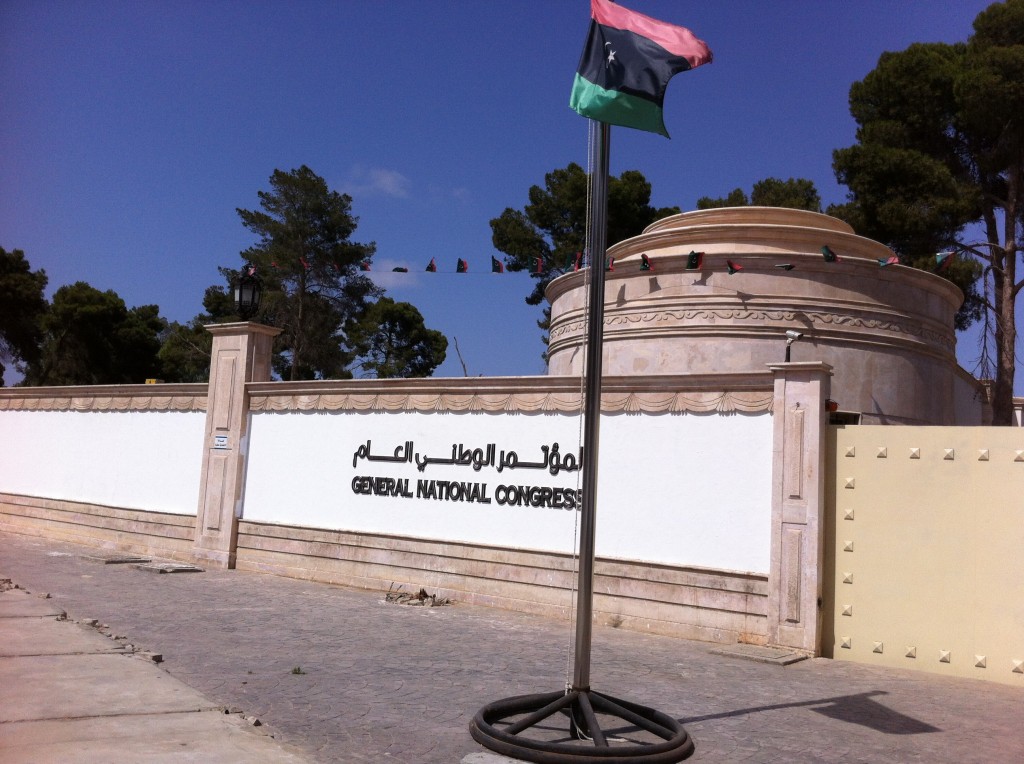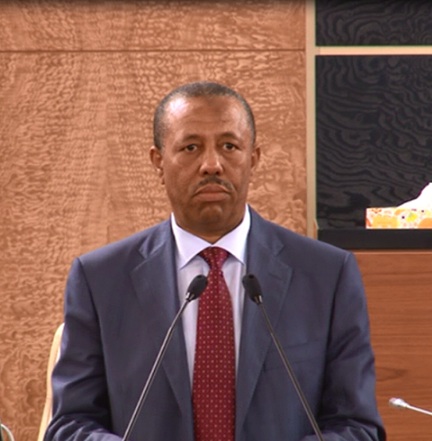By Lorianne Updike Toler.

Tripoli, 5 August 2013:
The General National Congress’ (GNC) 16 July passage of the electoral law for the . . .[restrict]constituent commission or assembly (CA) has scholars buzzing about the relationship of the two bodies and the loci of plenary or sovereign power. Recent proposals from within Libyan civil society and public academia call for the regulation of the CA by the GNC, assuming the latter has inherent power to do so. Other scholars and lawyers posit just the opposite, reasoning that as the power of both bodies derive from the same source—the Libyan people—they are coeval, preventing the GNC from regulating the CA.
Considering the confusion thus far as to who is authorized to act on behalf of the Libyan state as between the GNC and the Government, the question of power as between the GA and CA becomes all the more important.
The question is not simply answered in that the GNC currently acts as Libya’s legislature or that both the GNC and the CA will derive power from the ultimate sovereign power held by the Libyan people. Rather, the question is one of constitutional and comparative law. Here, Libya’s own Constitutional Declaration and the experience of other states will be referenced in answering this important question.
The Constitutional Declaration
For better or for worse, Libya’s Constitutional Declaration, created by the National Transitional Council (NTC) on 3 August, 2011, is Libya’s current temporary constitution. In the first clause of Article 30, the NTC is given “supreme,” plenary power on behalf of the Libyan state and is responsible for Libya’s management until the election of the GNC. Although it could be more explicit, the latter provision indicates that the NTC’s power expired because it became the GNC’s power upon the latter’s election. Thus, the GNC since its election has plenary legislative power and is responsible for the management of the Libyan state. In other words, it exercises sovereign power as delegated to its members by the people.
The sixth clause of Article 30 directs the GNC to appoint a constitutional commission to formulate the constitution. This provision was, of course, changed permanently by Amendment Four passed by the GNC on 9 April, 2013. Instead, the CA will be chosen through “free and direct polling.” Yet the nature of the CA’s power is not changed by Amendment Four—it still is to draft, or formulate, Libya’s constitution. Neither does Amendment Four or any of the three other amendments change the nature of the GNC’s power. Thus, as a matter of constitutional law, the CA has the power to draft a constitution and the GNC has—and will continue to have until they are replaced by a permanent legislature under a new constitution—plenary, sovereign power.
The constitutional investigation does not end here, however. Article 30’s seventh clause directs that, after the CA produces a draft constitution, the GNC must approve the draft before it is submitted to the people for ratification. Amendment Four did not change this procedure.
Does this un-amended provision make the CA subordinate to the GNC? Does the provision imply other powers of the GNC, such as the ability to regulate the CA, including timeline extensions and directing it to abide by certain international standards of constitution-writing (e.g., inclusiveness, transparency and carrying out public participation)?
In accordance with constitutional interpretive principles encouraging simplicity and clarity (and therefore fostering rule-of-law observance, procedural legitimacy, and voluntary compliance with the law), only explicit powers should be recognised. Further, relationships as between bodies governed by the Constitutional Declaration should be governed exclusively by the Constitutional Declaration. Such a constitutional interpretive methodology would prohibit the recognition of implied powers.
Applying these principles to the CA, it has no plenary legislative power under the Constitutional Declaration. Its functions are limited to creating a draft constitution. This means it cannot extend its own timeline or act on behalf of the Libyan state. It cannot pass laws regarding security or other pressing matters within Libya—such remains the province of the GNC.
Additionally within this legal rubric, the GNC has plenary legislative power, including the power of the purse, and can approve or reject a budget for the CA. Also, the GNC may approve (or disprove) the draft constitution produced by the CA. Finally, it has the power to amend the Constitutional Declaration. Therefore, any regulation outside of budgetary control or —including and perhaps especially as it relates to a timeline or guiding principles—must be accomplished through constitutional amendment.
Such limitation does not, however, prevent the GNC from preparing for the CA, so long as the measures are not compulsory. This could include forming a technocratic secretariat—which could later be formally approved by the CA—or making provision for an advisory scholarly research service to assist the CA.
Comparative Precedent
Libya is not controlled by the experience of other countries in drafting their constitutions, but from a legal perspective, it can provide helpful, nonbinding authority on how constitutional relationships work as between elected legislatures and elected constituent assemblies.
Three other countries have also had concurrent elected legislatures and separate elected constituent assemblies. These include Iceland (2013 failed draft), Bolivia (2009), and Uganda (1995). In the latter two countries, although there were other problems with the constitution or its implementation, the two elected bodies acted independently and the mandate of both was clear. Iceland’s case is more complicated.
Once in place, the Icelandic constituent assembly acted independently of parliamentary regulation other than for budgetary control. Yet the Icelandic Supreme Court invalidated the constituent assembly elections on a technicality (notably a first within Western constitutional experience). The Icelandic parliament or Althingi created a way around the ban by appointing those to a constitutional commission who would have been elected anyway. The only difference is that the final draft or changes were, after being submitted for a referendum, to be approved by the Althingi. This procedural change rendered Icelandic procedure very much like Libya’s Article 30, clause seven requirement of the GNC’s pre-approval of the final constitutional draft. For Iceland this change proved the completed (and popularly ratified) constitution’s undoing—at least for now.
In the last days of the Althingi’s session before new elections, in an attempt to bring the constitutional bill to a vote, one proponent added the bill as an amendment to another related bill scheduled for a vote before adjournment. As it happened, the related bill was voted down without the constitutional bill-amendment being given a hearing (in violation of its own procedure). Thus, despite its being written by an elected constituent assembly and ratified by a supermajority of Icelanders participating in the referendum, the draft constitution was prevented from becoming Iceland’s fundamental law—at least for now.
The more conservative Althingi elected earlier this year currently does not have the draft constitution on its agenda, but this does not prevent the current or future parliaments from considering it. By its own procedure, the draft Constitution requires two successive Parliaments to approve it.
In all, comparative precedent lends credence to the internal legal requirements of the Constitutional Declaration: the CA should be independent but limited to its constitutional task, leaving undisturbed the sovereign power of the GNC. Similarly and perhaps troublingly, comparative precedent in Iceland confirms the power of the GNC under Article 30, clause seven, to pre-empt passage or ratification of the constitution.
It remains yet to be seen if Libya will follow its own rule of law in maintaining a separation of plenary and constitutional powers as between its two elected bodies, permitting only those exceptions as explicitly provided for in the Constitutional Declaration and its Amendments. This author recommends that Libya build upon its precedent for complying with its constitutional rule of law by keeping the two bodies separate except as allowed by its Constitutional Declaration.
Rebecca Healey contributed to this article.
Lorianne Updike Toler is a constitutional lawyer and historian who, as head of Libertas Constitutional Consulting, is currently focused on providing comparative constitutional research for Libyans throughout their constitutional [/restrict]








